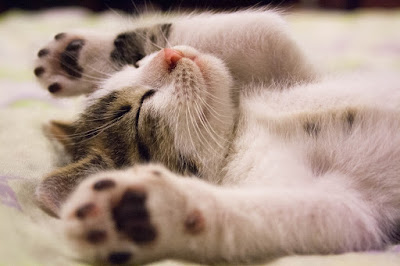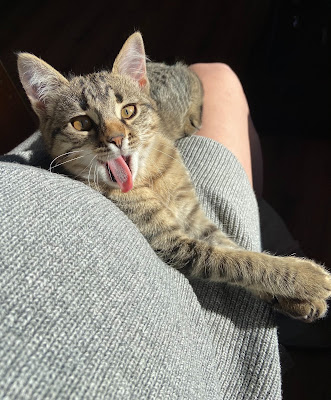Cat Fitness: Is Your Cat Healthy?
Knowing if your cat is healthy is a significant way to understand behaviors that your pet might be exhibiting. Typically they have a relatively high pain tolerance, which often means that they can be quite ill before they actually start showing any outward signs. Carefully checking your cats' skin, mouth, ears, eyes, and nose when petting or grooming is a monstrous routine to start and will help you note any changes in their physical health.
Behavioral Changes That Signal A Problem
Any time that your cat's behavior suddenly alters for no apparent reason you should anticipate that it might be a health-related issue. Behavioral changes are normal if there is a new addition to the home, be it a person, pet, or even new furniture, if someone the cat was affectionate towards having left, or if you have changed the cats' food, sleeping area, or other space. These environmental changes may result in your kitty hiding and not coming out for attention or a lot of crying, yowling, and the need for constant attention and contact with you, even if they have not been overly affectionate in the past.
Behavioral changes that indicate acute problems typically include behaviors such as:
- Vomiting
- Excessive drinking or a sudden increase in food consumption
- Excessive or very frequent urination
- Diarrhea
- Constipation or straining to go to the bathroom
- Frequent trips to the litter box without eliminating anything
- Blood in the urine or feces
- Discharge from the eyes or ears
- Discharge from the genitals
- Hair loss
- Excessive scratching or licking
- Lesions or rough, irritated areas of the skin that don't heal or spread
- Wounds with a foul smell or discharge
- Food refusal
- Refusing to consume water.
Seizures or times when the cat merely seems to stare off into space and is unaware of its surroundings
Following your cat to the vet immediately upon noticing any of these physical signs with or without a change in behavior with regards to attention or affection is very important. Initial treatment is essential to supporting your pet to recover.
Common Illnesses In Cats
A cat routinely vaccinated and treated for worms and fleas will typically very healthy, so routine, yearly vet visits and vaccinations are essential. Many people that keep their felines indoors don't regard vaccination as important, but there is habitually the chance your cat may get out or may be exposed to a virus from another pet, a human, or even through an insect bite.
There are inevitably health risks that cannot be prevented such as neurological problems due to bacterial infections or parasites, cancers and blood disorders, and other accident and injury conditions so why not take every precaution to avoid those that are preventable.
The common health problems seen in pet cat populations at the vet include:
Bites, scratches, and lesions:
kitty tends to be very aggressive and dangerous when fighting, so most cats at some point will be scratched, bit, or wounded and the hair will typically cover the areas unless there is some type of complication such as an infection. The infected area will be swollen and hot to the touch, typically there will in addition be a bloody or puss-like discharge. When this happens, the vet can surgically clean the wound of any destroyed and dead skin, leaving the area open to dry and heal without any infection. Antibiotics and a topical application sprayed or washed on the area may be required to help in preventing the infection from flaring back up.Eye discharge or squinting:
This can be a sign of a scratch or lesion on the surface of the eye that has become infected, or it can also be caused by a foreign object lodged on the surface of the eye or under the lid. A vet needs to anesthetize the area, examine the cornea and the eye structure, then repair any damage or produce the object. In some cases, the vet may additionally require drops to be put in the eye to assist with lubrication and healing.Ears:
Ear mites are common in cats and kittens are treated with drops rubbed into the ear on a routine schedule. Cats that are constantly grazing their sensitivities, rubbing with their paws, and even shedding the hair from in front of the ear with their scratching likely have ear mites.Digestive Problems:
Most digestive problems in cats are caused by sudden changes in the type of food they are eating or by the cat getting into garbage or other materials that make it sick. Vomiting, diarrhea, blood in the feces, or a discharge from the anus is all signs of digestive problems. Cats that refuse to eat; look bloated or distended in the abdominal area may enjoy intestinal blockages, hernias, or even severe worm infestations, especially if they are kittens or young cats.Cats can also be poisoned by eating mouse or rat poison, consuming certain plants, or even eating certain foods such as raisins, grapes, onions, garlic, tomatoes, or chocolate. Immediately consult with your vet and have the cat examined for potential digestive problems if you notice any of the symptoms listed above that last more than 24 hours.
Urinary problems:
Cats, especially males, are prone to urinary tract infections and blockages, cystitis, and bladder stones due to calcium build-up. Changing your cats' diet, using antibiotics to treat the infection, and encouraging your cat to drink as much liquid as possible is important. A couple of drops of canned tuna liquid in a small amount of water will really make a tasty treat that will help keep fluid moving through the kidney and bladder.Cancers:
Cats, like humans and all other animals, may develop different malignant and benign tumors and cancers throughout their bodies. These may be discovered on the skin and seen as lumps and swelling or maybe in the skeleton or internal organs. Watch for changes in eating, sudden weight gains or losses, or any signs of pain and sensitivity over the body.While this is not a comprehensive list of conditions seen in cats, it does give you an idea of the types of health issues that cats can develop.
Feeding Your Cat For Life
Taking the time to start your cat and kitten off with the best possible nutritional diet is really the best option. Cats are obligate carnivores, which means that they need meat and really not a lot more to stay healthy.
In most homes, cats will not be hunting for their meals so their food must contain the protein, minerals, and vitamins that cats need to stay healthy. Vets will usually recommend a premium dry kibble food for your cat or kitten as this helps keep the teeth and gums clean and free from plaque and tartar. Dry kibble is also important as it encourages your cat to drink lots of water, which helps with urinary tract blockages and infections. If you are not sure what type of food to feed your cat, talk directly with your vet. He or she will have a balanced dry food product that they will either sell or recommend.
In some cases, senior cats, cats recovering from surgery, or cats with dental or jaw problems may do better on a completely canned food diet for easy chewing and digestion. Again, your vet will be able to provide recommended brands or types of food that can be provided and are easily available in your area.









0 Comments
Spams Denied! Ask and Discuss healthy things